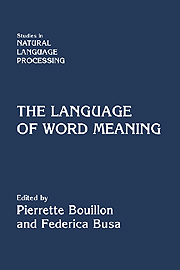Book contents
- Frontmatter
- Contents
- List of Contributors
- Preface
- Introduction: Word Meaning and Creativity
- Part I Linguistic Creativity and the Lexicon
- Part II The Syntax of Word Meaning
- Part III Interfacing the Lexicon
- 13 Introduction
- 14 Metaphor, Creative Understanding, and the Generative Lexicon
- 15 Metaphor in Discourse
- 16 Syntax and Metonymy
- 17 Generative Lexicon Meets Corpus Data: The Case of Nonstandard Word Uses
- Part IV Building Resources
- Index
13 - Introduction
Published online by Cambridge University Press: 07 October 2011
- Frontmatter
- Contents
- List of Contributors
- Preface
- Introduction: Word Meaning and Creativity
- Part I Linguistic Creativity and the Lexicon
- Part II The Syntax of Word Meaning
- Part III Interfacing the Lexicon
- 13 Introduction
- 14 Metaphor, Creative Understanding, and the Generative Lexicon
- 15 Metaphor in Discourse
- 16 Syntax and Metonymy
- 17 Generative Lexicon Meets Corpus Data: The Case of Nonstandard Word Uses
- Part IV Building Resources
- Index
Summary
The common thread that connects the first three papers is that, contrary to a wideheld view, metonymy and metaphor can be studied systematically. The contributors present and analyze various data sets that are taken to fall outside of the traditional areas of knowledge investigated in contemporary linguistic research. Our goal is to show that a subset of phenomena that have been labeled lexical idiosyncrasies (sense shift phenomena) and world/pragmatic knowledge effects (metonymy and metaphor) actually constitute a privileged window on the nature of lexical knowledge.
The papers by Julius Moravcsik and by Nicholas Asher and Alex Lascarides present detailed studies of metaphorical expressions. Their arguments are presented in such a way that it makes it clear how a particular data set may significantly affect the methodology for carrying out the study of the mental lexicon. In particular, while the lexicon can provide the key to understanding metaphor, in turn, this use of language represents actual evidence for determining the structuring of lexical information.
The paper by Jerry Hobbs extends, in an interesting and possibly controversial manner, the range of phenomena that are thought as metonymy: He makes us reconsider the relation between syntax and semantics. For example, as surprising as may be his treatment of extraposition as an instance of metonymy, we are forced to acknowledge the role of interpretive strategies when grammar alone fails to make sense of certain structures.
- Type
- Chapter
- Information
- The Language of Word Meaning , pp. 245 - 246Publisher: Cambridge University PressPrint publication year: 2001

